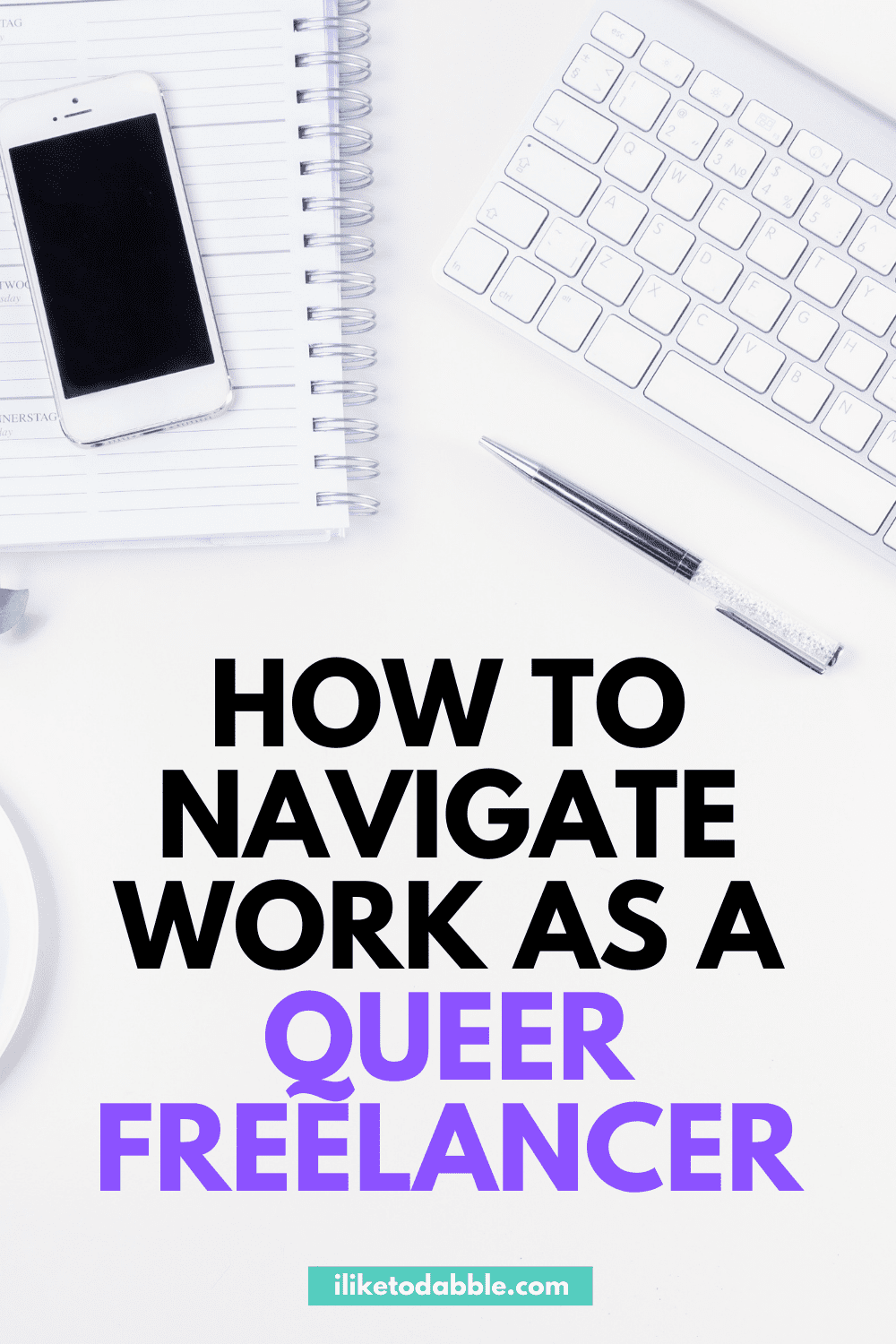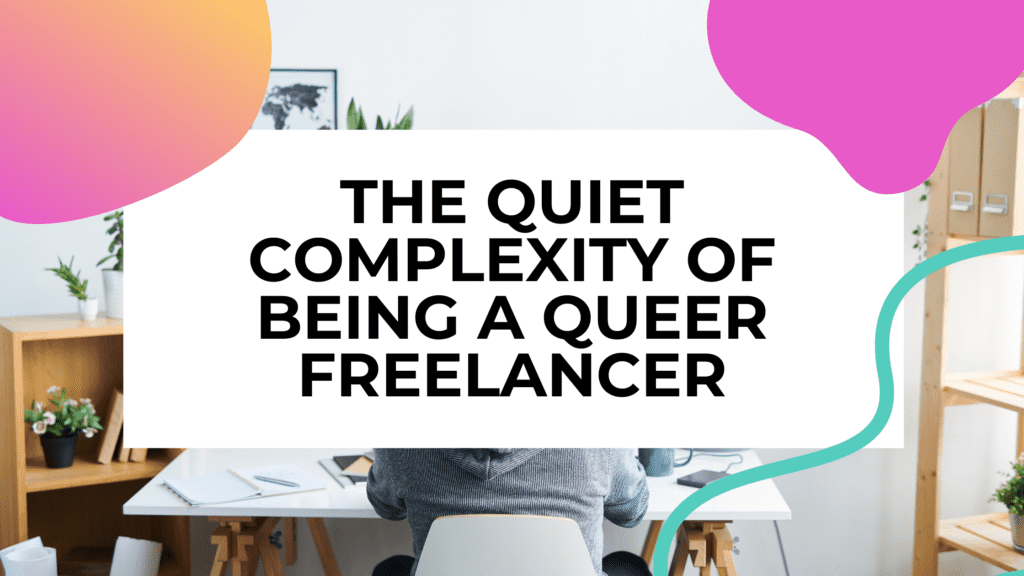Our website is supported by our users and contains affiliate links. We get paid when you purchase or sign up for anything through those links. Read the full disclaimer for more information.
Last Updated on July 4, 2022 by Daniella
Last year ahead of Pride Month, I got a surprisingly triggering request from a client I’d been writing for, for more than a year.
“We’re building out a piece for LGBTQI+ community members and was curious if you knew someone from that community that could be a great writer for us. No worries if not!”
My first thought? Some mix of disappointment and indignation — why had she assumed I wasn’t that writer they were looking for?
My second thought? That familiar self-loathing and shame about being a straight-passing queer woman. Obviously I wasn’t gay enough to do the job.
I referred her to another writer, someone who puts “LGBTQ” right her job title and writes about queer issues on the regular. She did a great job, and I was happy to refer work to a fellow freelancer.
But I’m still kicking myself for shrinking into the closet instead of letting that client know I was just who she was looking for.
Table of Contents
Freelancing While LGBTQ+
Freelancing and self-employment offer money-making lifelines for LGBTQ+ people and others who face bias in traditional workplaces.
As a contract worker, you can get gigs without an education requirement, a resume or an interview. You get hired on the merits of your work and — with clients doing things properly — don’t have to jump through the kinds of hoops you’d face trying to land a typical job. Your personal background doesn’t come up, and you don’t have to show up face-to-face with a potential employer. You can work remotely with people from all over the world, not restricted to your geographic community.
That difference is key for someone who risks being judged by the color of their skin, their hairstyle, their clothing, the way they speak, their legal history or their gender before even getting a chance to present the strength of their work.
That’s why I’m a huge advocate for self-employment for LGBTQ+ folks (and because we need to be in charge of more businesses!).
But working for yourself doesn’t eliminate the emotional labor that comes with serving clients or customers.
If the work you do isn’t explicitly related to queer or trans issues, your LGBTQ+ identity might never come up naturally with clients. Maybe that’s what you want — or maybe it sounds soul-crushing.
For me, connecting with new clients is one more way to contend with the exhausting reality of bi erasure. The thought of speaking up when a client asks for an LGBTQ+ writer sparks every insecurity — surely they want someone in a same-sex relationship, someone who’s transitioned, someone who knew they weren’t straight when they were, like, 7. Will they reject me for not being gay enough for their assignment?
And, because I’m always presumed to be straight by default, being recognized as an LGBTQ+ writer means coming out — over and over and over again.
The Unique Weirdness of Coming out to Clients
In the midst of another Pride Month, I’ve been seeing the perennial calls from publications encouraging LGBTQ+ journalists to send in pitches. That’s a great way to signal your allyship as an editor, but guess what it means for queer and trans writers?
Coming out. In our first contact with a stranger. As we’re attempting to get work.
Imagine it: An editor at a fashion magazine says she’s seeking pitches from LGBTQ+ writers. As a fashion writer who’s LGBTQ+, you’re eager to get published in this magazine. You craft your pitch about some summer fashion trend… and then what? Just casually state your gender or sexual identity in your email to make sure you’re not mistaken as cishet and get overlooked?
If this kind of scenario sounds fine to you, great. But showing up as LGBTQ+ with clients is a version of coming out, and for many of us, that means prodding at unhealed wounds and opening the door for new experiences of bias.
Getting any kind of job puts you in this position. Do you come out to your bo ss? Your co-workers? Your company’s clients? The janitors? The receptionist? But often, once you’ve done it, you’ve done it.
Doing short-term contract work means putting yourself in this position multiple times a year or even multiple times a month as you bring in new clients and continue to grow and shift your freelance roster.
Working for yourself gives you the privilege of choosing whether and when to come out to people you work with — and a lot of flexibility in who those people are. That can mean finding safety, comfort and job security that might not otherwise be available for you.
But staying quiet and passing as cis or straight is not a privilege. It’s a closet.
In my experience, with an identity that’s constantly erased or ignored, working from that closet is a regular reminder that my voice isn’t always welcome in the LGBTQ+ community, that my way of being gay isn’t worthy of pride, that coming out could invite discrimination or denial, that not even allies are safe — for me and for many, many people in our community.
Related:
- How Being Queer or Trans Affects Your Finances
- LGBTQ+ Career Resources
- LGBTQ+ Friendly Companies to Add to Your Job Search
- How to Become a Ghostwriter: A Beginner’s Guide
Pin it for later!


Dana Miranda is an entrepreneur and Certified Educator in Personal Finance®. She’s written about work and money for publications including Forbes, The New York Times, CNBC, NextAdvisor and a column for Inc. Magazine. She founded Healthy Rich to create a platform for inclusive, budget-free financial education.

